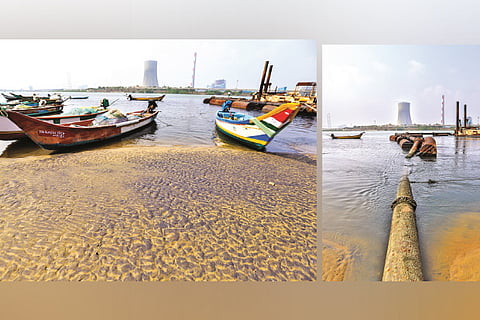

Chennai
But after 10 am, some thick oily substance starts flowing into the river and by evening, the fishes could be seen dead and floating. This is a recurring occurrence in Ennore and Manali areas, known for their polluting industries.
“The water flows from sea to river for almost six hours every morning and the river will be clean. But from 10 am, there will be a flow of chemical effluents into the waterbody. These effluents are raising a lot of health concerns as most of the people who use the water are complaining of skin disease. Most of us don’t have any alternative water source, be it for drinking or other domestic purposes,” said Balu, a resident of Nettukuppam.
Locals complain that some of the industries are letting out used chemical-mixed water into the river while some refineries in Manali are discharging used oil. “They are not to be discharged into the lake. If it continues like this, the livelihood and health of the fishermen community will be affected,” said another resident Selvam.
He pointed out that when they protest, the local politicians get involved and promise a solution to the problem “only to fool us.” Once the fishermen find oil presence in the river, they return home. “The chemical water and oil make the fish stink. We won’t be able to sell them,” said Rajini M, a fisherman.
“We have been fishing here for generations. Earlier, fishes were sold for Rs 100. Now we are not getting even Rs 20 for the same,” he added.
“The locals and activists often take to protests, but in vain. These industrialists are too powerful,” said Nityanand Jayaraman, an environmentalist. “Most of these polluting industries are in Manali and Ennore. But it is the working class and other oppressed communities who are at the receiving end. It is the modern form of untouchability that we witness nowadays, all because of these industries,” he said.
Jayaraman said the TNPCB for them is dead, as it plays no role to control or regulate polluting units. “If they were enforcing the law, the river would not have been in this sorry state,” he said.
When contacted, a senior TNPCB official said: “We inspect the river whenever we receive complaints. We were not able to find out who is committing the offence. There are many industries in the locality and all the pipes are interlinked. Pollutants are getting discharged from one pipe.”
Visit news.dtnext.in to explore our interactive epaper!
Download the DT Next app for more exciting features!
Click here for iOS
Click here for Android